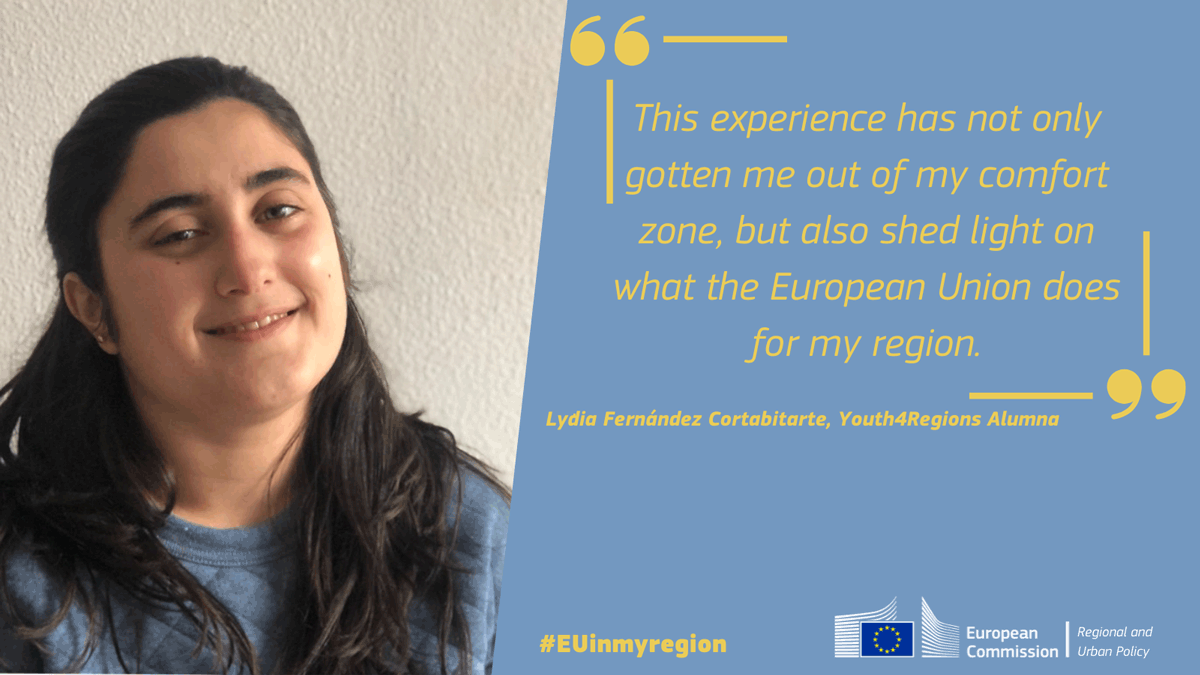Panorama
Youth4Regions series ep. 2: "Europe in a nutshell"
- 22 Jan 2025
Every year, during the EURegionsWeek the Youth4Regions programme selects the most promising young journalists from the EU and beyond and gives them the chance to explore EU policies, learn from seasoned journalists, and familiarise themselves with inner workings of European institutions. For the next four weeks, Panorama will host a series of articles that collect their impressions. Today’s guest writer is Lydia Fernández Cortabitarte from Spain, the views expressed are entirely her own and do not represent the official position of the European Commission.
A few weeks before this adventure started, I found myself sitting on the terrace of a small café in Ferrol, my hometown in Spain. With me was my grandmother, a woman who not only lived through the aftermath of the Spanish civil war and the dictatorship that ensued, but also through the birth and flourishing of what we now call the European Union. There, among the different conversations and jingle of glasses, she proudly explained to all her friends that her granddaughter was “going to Europe.” At that moment, I didn´t dare to correct her and give a long and arduous explanation of what the European Commission and Committee of the Regions was, because she was right: I was going to what many call “the heart of Europe.”
Trying to give an answer to the overly complex questions of what the European Union is and how it works, was one task we faced during the first day of the project. The solution is always along the lines of an endless dance of institutions and bureaucratic procedures. However, it was at that moment, in a glamorous room surrounded by 40 young journalists like me from all corners of Europe, that I realized that the answer was much simpler: Europe is diversity. In fact, that has been the motto of the EU since 2000: United in diversity.
The next couple of days did nothing but prove this theory. If we debated over the ethics of journalism, some would consider being invited for coffee a bribe while others would just call it good manners. No matter the workshop you attended, there would be at least three different languages being spoken. When we visited the newsrooms of Euronews, Euroactiv, and European Newsroom, we found journalists from Ireland, Spain, Italy, Germany, Netherlands, France, and the list goes on. Going a step further, at the EURegionsWeek official opening, representatives from a variety of political parties were called on stage and they were all from different regions of Europe, both from urban and rural areas.
Equal Opportunities
Diversity is not only measured in country representation, but also through an urban-rural ratio. Among us young journalists there were those who came from big, famous, and prosperous cities such as Berlin, Vienna, or Lisbon, but there were also those who, like me, came from underpopulated, underdeveloped, or badly connected regions. Nonetheless, here lies one of the many beauties of this programme: Youth4Regions bridged the gap of inequalities between European regions. Regardless of where we came from, we could all take part in a project whose core objective is to reduce interregional disparities.
Some of my colleagues were also from countries outside the European Union, such as Azerbaijan, Bosnia and Herzegovina, and Georgia, the latter a state that will soon debate at the polls if it turns towards or away from the union. Likewise, the presence of a young Ukrainian journalist reminded us of the gruesome war going on in Ukraine, at the gates of the EU. But just as words have meaning, so does silence: that of the Lebanese participants who sadly could not attend the program because of the armed conflict in the Middle East.
It is through their presences and absences that I was reminded that we can not take for granted what we once fought to have. The long-standing peace in Europe, that has been recently disrupted, was achieved thanks to the work of millions of Europeans fighting for prosperity and a better future. It is now our job as young journalists to fight against the extremism and misinformation that tries to blow it up.
The EU Regions’ Week and the Youth4Regions Program is now over, which means that it is time to apply in our communities and daily lives the lessons that we learned in this intense week. I can now walk up to my grandmother and her friends and explain that, yes, I was in Europe, but that I was as well in the European Commission and Committee of the Regions. The next time I see my university colleagues, I will tell them that there is such a thing as a Cohesion fund that aims to reduce the differences between all the regions in Europe, and that because of it Spain will receive 35.561.884.227 euros during 2021-2027. Whenever I walk with my mother, I will let her know that thanks to the EU Ferrol has a renewed economic kitchen, new machinery in the vocational training school, and more efficient street lighting.
This experience has not only gotten me out of my comfort zone, but also shed light on what the European Union does for my region. I hope now that all the participants in the program, thanks to everything and everyone we have met, can help shape Europe´s prosperous future.

